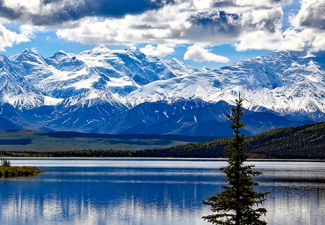NCEI's Alaska Region Climate Services deliver tools and information to communities and businesses to reduce climate risk and improve resiliency. Alaska is vulnerable to climate change. Significant climate warming trends during the last three decades have had major effects on the state’s environment and economy. If these trends continue, Alaska’s strongly natural resource-dependent economy could suffer. Predominant economic activities include oil production along the Arctic coast (20% of total U.S. production), fishing in the Bering Sea and off the south coast, forestry in the southeast, agriculture and forestry in the interior, and a growing tourism industry. Subsistence livelihoods in native communities throughout the state depend on fish, marine mammals, and other wildlife and play a very important social and cultural role.
Alaska’s ecosystems are also threatened. They range from cool spruce-hemlock forests in the southeast and south-central coastal regions to boreal spruce forests in the interior and south-central region. Further north, tundra meadows and barrens dominate. Large areas of land are set aside in national parks, wilderness areas, and nature preserves. Small areas of land are devoted to agriculture, with larger areas used for pasture and reindeer grazing. The marine ecosystems of the Bering Sea and Gulf of Alaska are among the most productive in the world and are highly susceptible to climate change.
Quarterly Climate Impacts and Outlooks
NOAA’s Quarterly Climate Impacts and Outlooks draw on sources across NOAA to provide concise and accessible climate information for various regions of the United States, including the Alaska and Northwestern Canada Region. These syntheses discuss the major climate events during the past three months and contain historical seasonal assessments as well as climate predictions and projections.
- National Weather Service - Alaska
- NOAA’s Regional Collaboration Team - Alaska Region
- National Integrated Drought Information System (NIDIS)
- American Association of State Climatologists
- Western Regional Climate Center
- Alaska Center for Climate Assessment and Policy
- Department of the Interior Climate Science Centers
- Landscape Conservation Cooperatives

